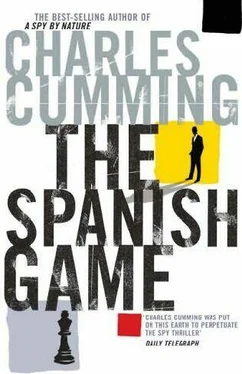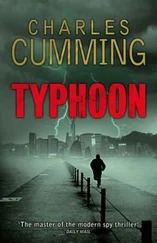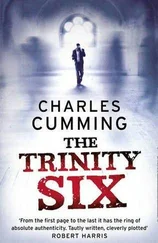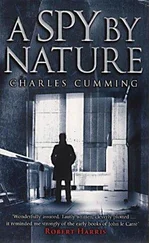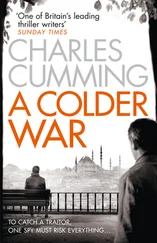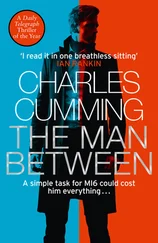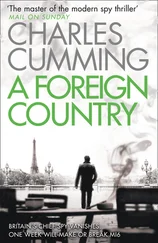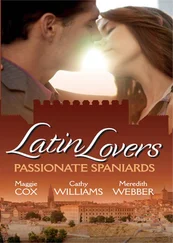Charles Cumming - The Spanish Game
Здесь есть возможность читать онлайн «Charles Cumming - The Spanish Game» — ознакомительный отрывок электронной книги совершенно бесплатно, а после прочтения отрывка купить полную версию. В некоторых случаях можно слушать аудио, скачать через торрент в формате fb2 и присутствует краткое содержание. Жанр: Шпионский детектив, на английском языке. Описание произведения, (предисловие) а так же отзывы посетителей доступны на портале библиотеки ЛибКат.
- Название:The Spanish Game
- Автор:
- Жанр:
- Год:неизвестен
- ISBN:нет данных
- Рейтинг книги:5 / 5. Голосов: 1
-
Избранное:Добавить в избранное
- Отзывы:
-
Ваша оценка:
- 100
- 1
- 2
- 3
- 4
- 5
The Spanish Game: краткое содержание, описание и аннотация
Предлагаем к чтению аннотацию, описание, краткое содержание или предисловие (зависит от того, что написал сам автор книги «The Spanish Game»). Если вы не нашли необходимую информацию о книге — напишите в комментариях, мы постараемся отыскать её.
The Spanish Game — читать онлайн ознакомительный отрывок
Ниже представлен текст книги, разбитый по страницам. Система сохранения места последней прочитанной страницы, позволяет с удобством читать онлайн бесплатно книгу «The Spanish Game», без необходимости каждый раз заново искать на чём Вы остановились. Поставьте закладку, и сможете в любой момент перейти на страницу, на которой закончили чтение.
Интервал:
Закладка:
‘It is Alec, yes?’
A big handshake, eyes that gleam on contact. The ladies’ man.
‘That’s right. And you must be Mikel.’
‘Yes indeed I am. Indeed.’
He moves forcefully, all muscle-massed shoulders and bulky arms, wit and cunning coexistent in the arrangement of his face. Was it my imagination, or did time stand still for a split second, the bar falling quiet as he came in? He is known here, a public figure. Arenaza nods without words at the older of the two barmen and a cana doble appears with the speed of a magic trick. His eyes are inquisitive, sizing me up, a persistent grin at one edge of his mouth.
‘You’ve found a table. This is not always easy here, it’s a triumph. So we can talk. We can get to know each other.’
His English is heavily accented and delivered with great confidence and fluidity. I do not bother to ask whether he would rather speak in Spanish; in the absence of Basque, English will be his preferred second language.
‘And you work for Julian?’ The question appears to amuse him. ‘He is the typical English banker, no? Eton school and Oxford?’
‘I guess so. That’s the stereotype.’ Only Julian went to Winchester, not Eton. ‘How do you know him?’
There is a fractional pause. ‘Well, we tried to do some business together a long time ago but it did not come off. However, it was an interesting time and now whenever I go to Madrid I always try to have a dinner with him. He has become my friend. And Sofia, of course, such a beautiful woman. The British always taking our best wives.’ A laugh here, of Falstaffian dimensions. Arenaza, who must be about Julian’s age, has sat down with his back to the room on a low stool which does nothing to diminish his sheer physical impact. He offers his glass in a toast. ‘To Mr and Mrs Church, and to bringing us together.’ Clink. ‘What is it that you think I can do for you?’
He may be in a hurry; the man-about-town with fifty better things to do. It occurs to me that whatever information he might usefully impart for my report will have to be extracted within the next half-hour. It is the challenge of spies to win the confidence of a stranger and I would like to know more about Mikel Arenaza, yet charisma of his sort usually denotes a distracted and restless personality. Time is of the essence.
‘What would be most useful for Endiom to know is your view on the question of separatism. What has become of your party in the wake of the ban? Do you think the Basque people would vote for independence in a referendum? That kind of thing.’
Arenaza bounces his eyebrows and puffs out his cheeks in a well-rehearsed attempt at looking taken aback. I note that he is wearing a very strong aftershave.
‘Well, it’s not unusual to meet an Englishman who arrives straight to the point. I assume you are English, no?’
I take a chance here, going with a pre-arranged plan based on Arenaza’s ideological convictions.
‘Actually my father was Lithuanian and my mother is Irish.’ Two sets of suitably oppressed peoples for a Basque to mull over. ‘They settled in England when my father found work.’
‘Really?’ He looks gratifyingly intrigued. ‘Your mother is from Ireland?’
‘That’s right. County Wicklow. A farm near Bray. Do you know the area at all?’
Mum is actually Cornish, born and bred, but ETA and the IRA have always had very close ties, shared networks, collective goals. About a year ago a general in the Spanish army was killed by a bicycle bomb, a technique ETA were believed to have acquired from the Irish.
‘Only Dublin,’ Arenaza replies, offering me a cigarette which I decline. It’s a South American brand – Belmont – which I have seen only once before. He lights one and smiles through the initial smoke. ‘I have been to several conferences there, also once to Belfast.’
‘And you’re just back from South America?’
He looks taken aback.
‘From Bogota, yes. How did you know this?’
‘Your cigarettes. You’re smoking a local brand.’
‘Well, well.’ He mutters something to himself in Basque. ‘You’re a very observant person, Mr Milius. Julian makes a good decision in hiring you, I think.’
It is a politician’s flattery, but welcome none the less. I say, ‘ Eskerrik asko’ – the Basque for ‘thank you’ – and lead him back into the conversation.
‘So you want to know what has become of Herri Batasuna?’
‘That’s right. To hear it from someone so close to the centre would be very useful.’
‘Well, it is a complicated situation as you can probably be guessing. It is not only my party that is affected. I am sure you have already been informed about what happened last week?’
‘With Egunkaria?’ At dawn on 20 February, a Thursday, masked members of the Guardia Civil burst into the offices of the Basque newspaper Egunkaria and arrested ten of its executives, accusing them of supporting ETA. ‘I heard the police were a bit heavy-handed. Didn’t they go in wearing bulletproof vests?’
‘That’s right. That’s right. It was ridiculous. These are newspaper offices. What are the staff going to shoot them with? Ink?’ I laugh encouragingly as Arenaza spends fifteen minutes telling me things I already know: that more than a hundred men were ordered to search and board up Egunkaria offices throughout the Basque country and Navarra; that they confiscated documents and computer records; that several Basque publishers offered temporary offices and printing facilities to enable the paper to go to press. ‘It was a direct attack on our culture,’ he says finally. ‘This was the only newspaper in the region to publish entirely in Euskera.’
‘And what about the accusation that it was funded by ETA?’
Arenaza tilts his head very slightly to one side so that his eyes momentarily lose their sheen. This may be a sign of irritation or simply a warning to me to be more discreet.
‘I cannot speak for E-T-A,’ he says, spelling out each letter to disguise the acronym, ‘but these accusations were also directed at another newspaper, Egin, during 1998 before it was also banned by Madrid. They say that the armed struggle wanted a Basque-language newspaper, that they moved shares from Egin to Egunkaria to pay for this, and that they nominated certain journalists to be editors. And this is bullshit, of course. Total bullshit.’ Arenaza takes a relaxed drag on his cigarette. His mood is one of nonchalance bordering on conceit. ‘If you want to talk about funding, let’s talk about funding. Egunkaria was given six million euros by the state government, and still the PP accuses them of “political responsibility” in the spread of terrorism. These people are just fascists, Alec. Ignorant fascists.’
I have noticed over the last few days that parties on either side of the Basque conflict use exactly the same terminology when attacking one another. Thus, Aznar is ‘a fascist’, Ibarretxe, the president of the Basque region, is ‘a fascist’, ETA are ‘a bunch of fascists’, and so on. A useful way of polarizing the debate for those with no interest in resolving it. Still, I nod approvingly, careful to remain on the right side of Arenaza’s prejudices. He suggests we have another drink. Within a few moments he has returned from the bar armed with more canas and two large plates covered in pintxos.
‘The best tapas in the Parte Vieja,’ he says, an arm falling on my shoulder, and I know now that he is warming to me. Arenaza is a man’s man and, for some reason, his sort always like me. We talk for a long time about the superiority of Basque cuisine over all others, which is at least a subject about which I can speak with real sincerity. But in due course he is keen to return to Egunkaria. There is now a powerful smell of alcohol on his breath and I wonder if he was drinking over lunch.
Читать дальшеИнтервал:
Закладка:
Похожие книги на «The Spanish Game»
Представляем Вашему вниманию похожие книги на «The Spanish Game» списком для выбора. Мы отобрали схожую по названию и смыслу литературу в надежде предоставить читателям больше вариантов отыскать новые, интересные, ещё непрочитанные произведения.
Обсуждение, отзывы о книге «The Spanish Game» и просто собственные мнения читателей. Оставьте ваши комментарии, напишите, что Вы думаете о произведении, его смысле или главных героях. Укажите что конкретно понравилось, а что нет, и почему Вы так считаете.
